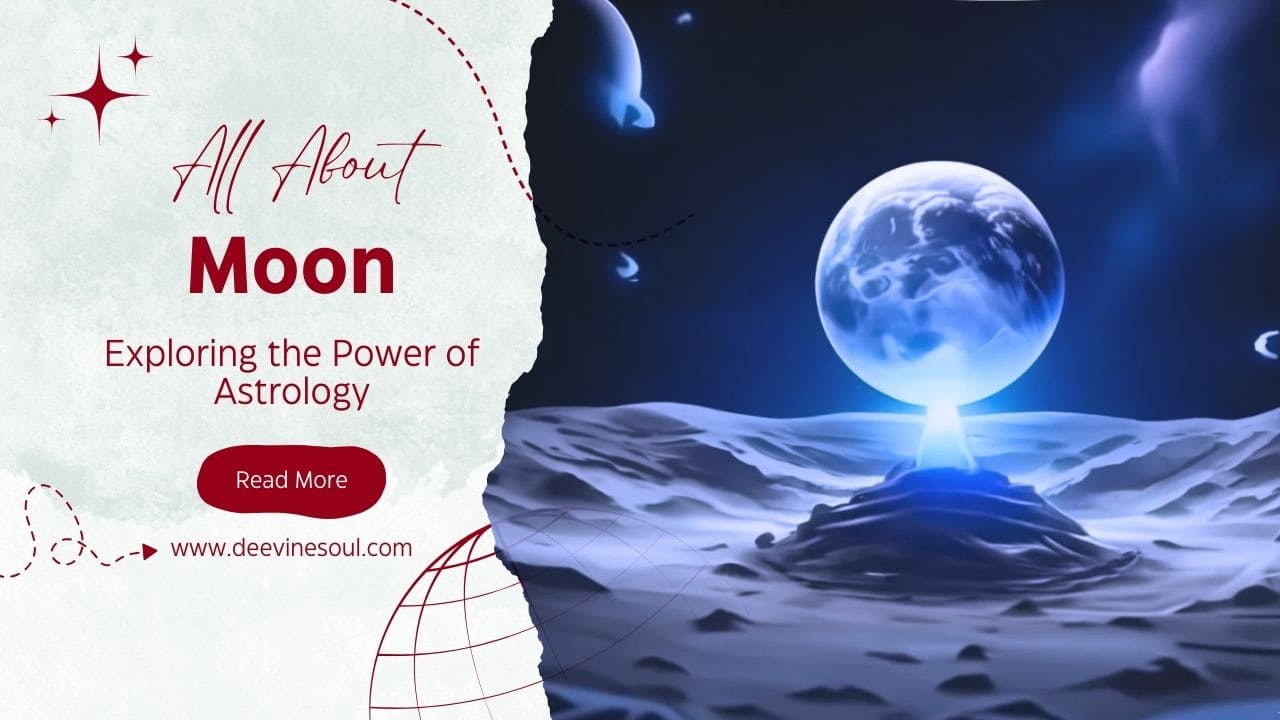Moon
The Moon plays a significant role in astrology and the birth chart. It represents our emotions, subconscious, instincts, and how we nurture ourselves and others. The Moon’s placement in a birth chart can indicate our emotional needs, habits, and responses to the world around us.
The Moon’s sign in the birth chart reveals our inner self, how we express our feelings, and our comfort levels. For example, someone with the Moon in Cancer might be deeply connected to their family and home, valuing security and emotional closeness. On the other hand, a person with the Moon in Aquarius might be more emotionally detached, valuing independence and intellectual pursuits.
The Moon’s aspects to other planets in the birth chart can also provide valuable insights. For instance, a harmonious aspect between the Moon and Venus can indicate someone who is loving, nurturing, and values beauty and harmony in relationships.

Characteristics of the Moon in Astrology
The moon holds significant importance in astrology, symbolizing emotions, instincts, and habits. Understanding its characteristics can provide insights into our inner selves and how we navigate the world.
Here are key aspects of the moon in astrology:
Emotional Depth
The moon reflects our emotional depth, revealing our innermost feelings and how we process them. It influences how we express ourselves emotionally and our reactions to various situations.
Intuition
Associated with intuition, the moon guides us in making decisions based on our instincts and inner knowing. It helps us connect with our subconscious mind and understand our deepest desires and fears.
Nurturing
The moon represents nurturing and caregiving qualities, reflecting how we nurture ourselves and others. It influences our ability to create a sense of security and comfort in our lives.
Imagination
Linked to imagination and creativity, the moon inspires us to explore our creative side and express our emotions through art, music, or other forms of self-expression.
Adaptability
The moon’s phases symbolize change and adaptation. It teaches us to embrace life’s cycles and be open to new experiences, helping us grow and evolve.
Reflective Nature
Just as the moon reflects the light of the sun, it encourages us to reflect on our lives and past experiences. It urges us to learn from our mistakes and make positive changes for the future.
Cyclical Patterns
The moon’s phases, from new moon to full moon and back, symbolize cyclical patterns in life. It reminds us that life is full of ups and downs, and each phase has its own beauty and purpose.
Feminine Energy
In astrology, the moon is often associated with feminine energy, representing qualities such as nurturing, intuition, and receptivity. It encourages us to embrace these qualities within ourselves and in our interactions with others.
Connection to the Past
The moon is also linked to our past, ancestral roots, and childhood memories. It influences how we relate to our past experiences and how they shape our present actions and behaviors.
Dreams and Aspirations
The moon is associated with dreams and aspirations, encouraging us to pursue our goals with passion and determination. It inspires us to dream big and believe in the power of our visions.
Moon Sign vs. Moon Placement in the Birth Chart
In astrology, the Moon sign and the Moon’s placement in the birth chart are two distinct elements that offer valuable insights into a person’s emotional nature and inner self. While they both relate to the Moon’s influence, they provide different layers of understanding.
Moon Sign: The Moon sign, also known as the lunar sign, represents the zodiac sign in which the Moon was located at the time of your birth. It signifies your emotional needs, instincts, and how you express your feelings. Your Moon sign reflects your innermost self, revealing your deepest desires, fears, and reactions to different situations.
For example, someone with a Moon in Aries may have a fiery and impulsive emotional nature, while someone with a Moon in Pisces may be more empathetic and dreamy. Your Moon sign influences how you nurture yourself and others, as well as your emotional responses to life events.
Moon Placement in the Birth Chart: The Moon’s placement in the birth chart refers to the house in which the Moon is located at the time of your birth. Each house represents a different area of life, and the Moon’s placement in a particular house can indicate where your emotions are most strongly felt and expressed.
For instance, if your Moon is in the 4th house, which represents home and family, your emotions may be closely tied to your family life and upbringing. If your Moon is in the 10th house, which represents career and public image, your emotional well-being may be closely connected to your professional life and aspirations.
Differences: While the Moon sign and the Moon’s placement in the birth chart both relate to the Moon’s influence, they provide different layers of information. Your Moon sign reveals your emotional needs and instincts on a personal level, while the Moon’s placement in a specific house indicates how your emotions are expressed in different areas of your life.
Understanding both your Moon sign and the Moon’s placement in your birth chart can offer a more holistic view of your emotional nature and help you navigate your feelings and relationships with greater insight and awareness.
Moon in Different Astrological Houses
In astrology, the position of the Moon in different houses of the natal chart influences a person’s emotional nature, habits, and instincts in specific areas of life. Each house represents different aspects of life, and the Moon’s placement in a particular house can reveal how a person’s emotions are expressed and experienced in that area.
Here is an overview of the Moon’s influence in each astrological house:
Moon in the 1st House (Ascendant)
Individuals with this placement are deeply connected to their emotions and project a strong emotional presence. They may be sensitive to their environment and have a nurturing nature.
Moon in the 2nd House
This placement can indicate emotional security through material possessions and financial stability. Individuals may have a strong attachment to their belongings and seek comfort in material comforts.
Moon in the 3rd House
People with this placement have a strong emotional bond with their siblings and local community. They may be sensitive to communication and have a nurturing way of expressing themselves.
Moon in the 4th House (IC)
The Moon is at home in the 4th house, representing home, family, and roots. Individuals with this placement are deeply connected to their family and heritage, seeking emotional security through their home environment.
Moon in the 5th House
This placement can indicate a strong emotional connection to creativity, children, and romance. Individuals may seek emotional fulfillment through creative expression and may have a nurturing approach to parenting.
Moon in the 6th House
People with this placement may have strong emotional ties to their work and daily routines. They may seek emotional fulfillment through service to others and maintaining a healthy lifestyle.
Moon in the 7th House (Descendant)
This placement can indicate a strong emotional need for partnership and harmony in relationships. Individuals may seek emotional security through their relationships and may be nurturing and supportive partners.
Moon in the 8th House
Individuals with this placement have intense emotional experiences related to transformation, shared resources, and intimacy. They may seek emotional depth in their relationships and have a strong intuition about others’ emotions.
Moon in the 9th House
This placement can indicate a strong emotional connection to philosophy, spirituality, and higher education. Individuals may seek emotional fulfillment through expanding their horizons and exploring different belief systems.
Moon in the 10th House (Midheaven)
People with this placement may have a strong emotional attachment to their career and public image. They may seek emotional fulfillment through achieving their professional goals and may have a nurturing approach to leadership.
Moon in the 11th House
This placement can indicate a strong emotional bond with friends, groups, and social causes. Individuals may seek emotional security through their social connections and may be nurturing and supportive friends.
Moon in the 12th House
Individuals with this placement have a deep, subconscious emotional life and may be highly intuitive or psychic. They may seek emotional fulfillment through spiritual practices and solitude.
Moon's Role in Relationships
The Moon plays a significant role in astrology when it comes to relationships, influencing how individuals express emotions, seek emotional security, and form connections with others. Understanding the Moon’s role in relationships can provide valuable insights into compatibility and emotional dynamics between individuals.
Here’s an elaboration on the Moon’s role in relationships:
Emotional Compatibility
The Moon sign in an individual’s natal chart can indicate their emotional needs and how they express love and affection. When two people’s Moon signs are compatible, they are more likely to understand and meet each other’s emotional needs, fostering a deeper connection.
Nurturing and Support
The Moon represents nurturing and caregiving qualities in relationships. Individuals with a strong Moon influence are likely to be nurturing and supportive partners, providing emotional comfort and stability to their loved ones.
Emotional Bonding
The Moon’s placement in a person’s chart can indicate their ability to form emotional bonds in relationships. A well-aspected Moon can signify a strong emotional connection with their partner, leading to a more fulfilling and harmonious relationship.
Security and Stability
The Moon represents emotional security and stability in relationships. Partners who feel emotionally secure are more likely to trust each other and build a strong foundation for their relationship.
Family Dynamics
The Moon also influences family dynamics and the role of family in relationships. Individuals with a strong Moon influence may prioritize family values and seek partners who share similar values.
Parenting Style
The Moon can indicate parenting style and attitudes towards children in relationships. Understanding each other’s Moon signs can help partners navigate parenting challenges and support each other in their roles as parents.
Frequently Asked Questions
How does the Moon’s placement in a natal chart affect relationships?
The Moon’s placement can indicate emotional needs and how they are expressed in relationships. For example, a person with the Moon in a water sign may seek deep emotional connections, while a person with the Moon in an air sign may prioritize intellectual compatibility.
Can the Moon’s phases affect mood and behavior?
Yes, the Moon’s phases are believed to influence mood and behavior. For example, some people may feel more energized and optimistic during the full moon, while others may experience heightened emotions or restlessness.
What role does the Moon play in fertility and conception?
In astrology, the Moon is associated with fertility and conception. Some believe that certain lunar phases are more conducive to conception, while others may influence the gender of the child.
How can one enhance their connection to the Moon’s energy?
Practices such as moon-gazing, meditation, and rituals during specific lunar phases can help enhance one’s connection to the Moon’s energy. Keeping a lunar journal to track emotions and energy levels can also be beneficial.
Is there a difference between the Moon sign and the Sun sign in astrology?
Yes, the Moon sign represents one’s emotional nature and inner self, while the Sun sign represents one’s outward personality and ego. Both are important in astrology and contribute
